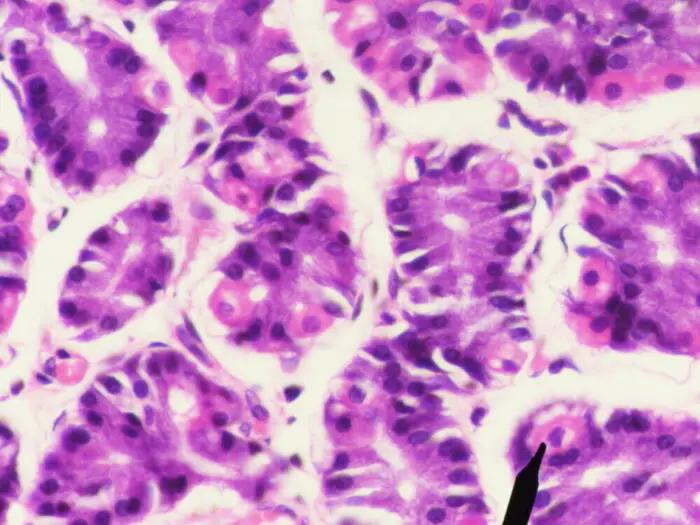Recently after doing some research for another blog post I started thinking about this – What is the Difference Between Achlorhydria and Hypochlorhydria? I already knew what Hypochlohydria was and also Hyperchlorhydria (high stomach acid) but Achlorhydria was new to me.
So, I thought I would investigate and turn this into a blog post.
Now, In the simplest terms, Achlorhydria means your stomach doesn’t produce ANY hydrochloric acid at all. The A is for Absent!
In contrast, Hypochlorhydria refers to having too little stomach acid. So as you can Imagine one basically leads to the other if it is not treated.
For those that don’t know about Stomach Acid this is Important for a number of reasons but predominantly for our digestive system to function properly. We need this acid also to absorb Important nutrients (vitamins and minerals) and to keep harmful pathogens at bay.
I will certainly discuss this more throughout this Information but mostly what I will be focusing on is this main question…
What is the Difference Between Achlorhydria and Hypochlorhydria?
Now, the absence or reduction of stomach acid isn’t just an interesting topic for med students; it can have genuine consequences on your well-being. Without adequate stomach acid this can lead to vitamin deficiencies, digestive troubles, and even increased susceptibility to infection. It is REALLY THAT IMPORTANT!
Exactly why In this article, I’m going to share with you about the underlying causes, symptoms, and potential treatments for Achlorhydria and Hypochlorhydria, and how to differentiate between the two.
Both conditions need to be on your radar because understanding them is a step toward better health.
Now…
The Mechanisms of Stomach Acid Production
In my opinion, understanding the intricacies of how your stomach generates acid is crucial when differentiating between Achlorhydria and Hypochlorhydria.
For this purpose I’m going to break down the basics so you’re well-grounded in the subject.
So, what’s happening inside your stomach?
Primarily, the stomach walls have cells called Parietal Cells that produce Hydrochloric Acid (HCl). It’s a fascinating process really; these cells secrete this strong acid along with intrinsic factor, an essential component for vitamin B12 absorption.
You might wonder why this acid, which could eat through metal, doesn’t harm the stomach itself?
This is because your stomach lining has a protective mucous layer that deflects the acid’s corrosive effects.
Moreover, certain proteins in the stomach lining repair damage as quickly as it occurs – a dynamic defence system.
When Parietal Cells Do Not Work

Now, the plot thickens! When stomach acid production doesn’t go as planned. If these Parietal cells EITHER DON’T produce enough acid or produce none at all, it leads to Hypochlorhydria or Achlorhydria, respectively.
And that’s where the difference lies between the two conditions.
Now, Choose Something that Resonates with You?:
The fact that proper acid levels are necessary for breaking down food, especially protein, OR that stomach acid acts as the first line of defence against pathogens.
Both are pivotal roles, and having insufficient acid can be problematic.
But, this isn’t just about digestion; it’s also about absorption.
You see, stomach acid activates digestive enzymes and helps absorb certain minerals like zinc, iron, and calcium.
A reduction in acid levels can therefore interfere with the nutrient absorption process.
There’s a lot of opportunity in this knowledge. Understanding the importance of stomach acid sheds light on why disturbances in its production can have a significant impact on overall health.
And with that, let’s transition into what happens when your body can’t produce enough acid, starting with Achlorhydria.
Achlorhydria: The Absence of Stomach Acid
Now what exactly is Achlorhydria? I have answered this already but just to clarify – this is when our stomachs supply of Hydrochloric acid (HCL) has been completely depleted, and as HCL is a crucial component of the gastric juice that helps digest food this is not good news.
So you might be wonder, if this so apparent, and more so how do we even realize if we have have this condition?
But, it should be noted that symptoms can vary, and some of us will mistakenly shrug these off as routine digestive discomforts.
Yet, common signs to watch for include Bloating, Chronic Indigestion, and and as a result poor absorption of vitamins and minerals, such as;
- Vitamin B12,
- Iron, and
- Calcium.
Exactly why If you’re suspecting you might have Achlorhydria, you should know the next steps involve visiting a healthcare provider for appropriate tests to determine what is actually going on.
Typically, doctors may perform a gastric pH test to measure acidity levels in the stomach. Low or absent levels can confirm the diagnosis of Achlorhydria.
But it’s not just about identifying the condition; understanding the ‘why’ behind it’s important too.
What Are The Causes of Achlorhydria?
Causes can range from autoimmune disorders, where the body’s immune system attacks its own cells, to chronic use of acid-reducing medications.
Even certain surgical procedures on the stomach can lead to Achlorhydria, and this is not all. If you get Achlorhydria this can invite unwelcome complications like bacterial overgrowth in the stomach or intestines due to the absence of acid’s protective barrier.
This can lead to recurring infections and digestive turmoil.
Additionally, insufficient stomach acid severely impacts the digestion and absorption of vital nutrients, paving the way for potential nutritional deficiencies and their associated health issues over time.
However, to a lesser degree its Important to understand about Hypochlorhydria too, where the stomach still produces some acid, but not quite enough.
The challenges are similar, but as you’ll see, there’s a spectrum when it comes to these conditions. Now…
What Is Hypochlorhydria
On the other hand Hypochlorhydria is a condition characterized by reduced levels of stomach acid, which, while not a complete absence like Achlorhydria, can still lead to notable digestion problems.
You might be experiencing Hypochlorhydria if you’re dealing with symptoms such as;
- Bloating,
- Gas,
- Upset Stomach, and
- Nutrient Deficiencies.
These are clues that your stomach isn’t producing enough acid to properly break down food and absorb nutrients.
In my opinion, the difference between Hypochlorhydria and Achlorhydria lies in their severity and underlying causes.
Hypochlorhydria is often seen as the preliminary stage that could, in time, progress to Achlorhydria if left unaddressed.
A variety of factors can reduce stomach acid levels. These include;
- Getting older (aging),
- Prolonged and Chronic Stress,
- Excessive Use of Antacids,
- and other certain medications such as PPIs.
If you want to prevent it, paying attention to these aspects is crucial.
The Consequences of Reduced Stomach Acidity
Reduced stomach acidity might not sound like a big deal, but it’s a part of a domino effect. Without sufficient acid, not only is digestion compromised, but also the absorption of vital nutrients like Vitamin B12, Iron, and Calcium.
This can lead to more significant health issues if not managed well.
The long-term effects of Hypochlorhydria shouldn’t be taken lightly. Over time, insufficient stomach acid can increase your risk of infections, as the acid barrier to pathogens is weakened, and contribute to the development of chronic digestive disorders.
Managing Achlorhydria and Hypochlorhydria
If you’re facing a diagnosis of Achlorhydria or Hypochlorhydria, you might be feeling overwhelmed, but it’s important to know that there are effective ways to manage these conditions.
For starters, medical treatments can include the use of supplemental hydrochloric acid to aid digestion or proton pump inhibitors and H2 blockers, particularly in cases where acid reflux is an issue due to prolonged hypochlorhydria.
(*Note I do NOT recommend Proton Pump Inhibitors or H2 Blockers but this is just me)
Always consult with your healthcare provider to develop a plan that’s tailored to your needs.
Focusing On a Healthy Diet
Adjusting what you eat can be transformative. You may find relief from symptoms by incorporating easily digestible foods and steering clear of those that can increase gastric irritation, such as overly spicy or processed items.
Probiotics and certain nutritional supplements might be beneficial. It’s possible that improving your gut flora and addressing any nutrient deficiencies can help in managing symptoms.
Don’t shy away from discussing these options with a dietitian.
Make Sure To Keep Working Towards Getting Better
Consistency with medical check-ups is crucial, as these conditions can lead to complications if not monitored. Your doctor can keep an eye on your stomach health and adjust your treatment as necessary.
Remember, education is power.
Understanding your condition helps you make informed decisions about your health, and your healthcare team is a valuable resource in this journey.
So something to think about…
Does Achlorhydria Completely Stop Digestion
I thought this would be good to add in here. For anyone curious – SO Achlorhydria is a condition where there’s an absence of HCL in the stomach. HCL plays a crucial role in breaking down food and killing bacteria in the stomach, although it’s not the only component of digestion.
Other digestive enzymes, such as pepsin, are also needed for breaking down proteins. For this reason, it should be noted that while Achlorhydria can impair the digestion process, it doesn’t completely stop it from happening. To some degree digestion will be happening.
However, with this being said Achlorhydria can lead to various digestive issues and nutrient deficiencies – because the absence of stomach acid affects the breakdown and absorption of certain nutrients, especially proteins and minerals like Iron and Calcium.
Prevention and Awareness of Low Stomach Acid
On a final note, I’m going to wrap up our discussion on Achlorhydria and Hypochlorhydria by emphasizing the power of prevention and awareness. By understanding the signals our body sends us is critical in maintaining not just our digestive health, but our overall well-being.
So, it is Important to choose something that resonates with our own preferences when it comes to managing our digestive health.
Whether it’s incorporating a balanced diet, staying hydrated, or managing stress, remember that these seemingly small choices can make a big difference in the short term and also the long run.
Regular check-ups with a healthcare provider too are a crucial part of catching potential issues early. So don’t hesitate to reach out to a professional if you notice symptoms that could suggest a problem with stomach acid levels.
If you suspect you’re experiencing symptoms of either Achlorhydria or Hypochlorhydria, you must do something about it. A proactive approach can help you take control of your health and ensure your digestive system is functioning at its best.
Being informed and vigilant about your health is always the best strategy. I hope the knowledge about these two conditions has been helpful for you. I am going to finish this article up here but if you would like to read more (Check Out Our Page HERE)

Anxiety and Depression best ways to lower blood sugar BiOptimizers blood pressure supplements blood sugar support supplements Digestive Enzymes Supplement digital products Dr Sam Robbins Exercise Gut Health Healthy Living heart health HFL how to lower blood sugar levels How To Lower Cholesterol insulin resistance joint health supplement Keto keto dieting Keto Diet Weight Loss leaky gut supplements leptin resistance list Magnesium deficiency Matt Gallant mental health multivitamins Nootropics nutrient supplements Probiotics Probiotic Supplements Prostate Health proteolytic enzymes reverse type 2 diabetes stress and anxiety stress relief Tinnitus vitabalance vitapost Wade Lightheart weight loss articles weight loss diet plans weight loss product reviews weight loss supplements weight loss tea

Your site loads up incredibly fast, and the content is top-notch. You’ve done a fantastic job, and I appreciate your efforts.
Thank you glad you like.